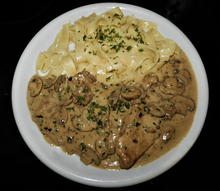This article includes a list of references, related reading, or external links, but its sources remain unclear because it lacks inline citations. (December 2021) |
Jägerschnitzel (German for 'hunter's cutlet', in French escalope chasseur) is a German dish made of a roast veal or pork cutlet with a sauce made of mushrooms and tomatoes or cream. In regional cuisine the dish can also be a schnitzel made of breaded, roasted jagdwurst with tomato sauce and Spätzle noodles.


Classic preparation
editTo prepare jägerschnitzel in the classic way, an unbreaded veal cutlet is first roasted in butter. The sauce is made of shallots soaked in white wine and cooked in a tomato sauce, and mixed with sliced champignons, chanterelles and morels. A variation of the dish is a shortly[vague] roasted pork cutlet in sour cream topped with fried onions, chanterelles and bell pepper.
A common variety of jägerschnitzel consists of a breaded pork cutlet with a dark mushroom cream sauce. It is usually served with french fries, noodles or rice.
East German variation
editA common regional variation in the former East Germany is made from jagdwurst, a type of pork sausage, or alternatively, Soviet "doctor's sausage". To prepare jägerschnitzel from jagdwurst, the sausage is first cut into finger-thick slices, breaded with bread roll crumbs and roasted in cooking oil or clarified butter until crispy and topped with tomato sauce. It is usually served with pasta, potatoes (mashed potato, french fries or potato salad), or served alone as a snack.
The dish was popular in East Germany, particularly served in volume at canteens or as a school meal, often served with vegetables and lecsó.
Bibliography
edit- Herbert Frauenberger: Ostdeutsche Gerichte mit Geschichte(n), Second edition. BuchVerlag für die Frau, Leipzig 2017, ISBN 978-3-89798-513-1, p. 64.
External links
edit- Media related to Jägerschnitzel at Wikimedia Commons
- Jägerschnitzel at Wikibooks